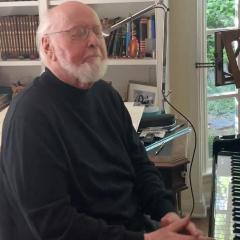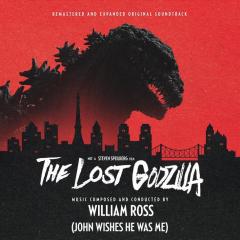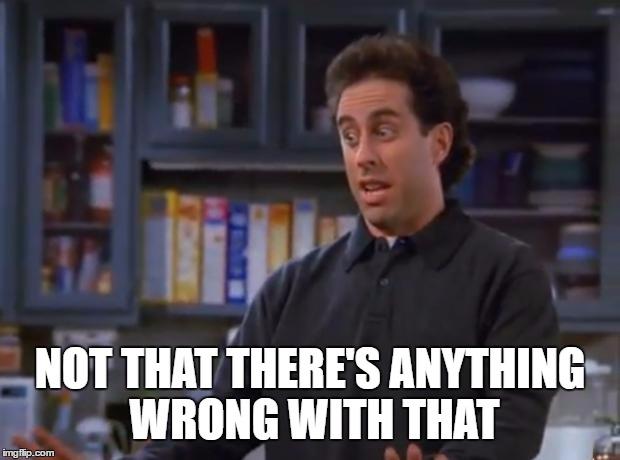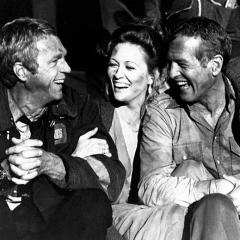Leaderboard
Popular Content
Showing content with the highest reputation on 21/05/20 in Posts
-
THE EMPIRE STRIKES BACK: 40th Anniversary
SingeMoisi and 10 others reacted to crumbs for a topic
Happy 40th Anniversary to one of John's greatest ever film scores, The Empire Strikes Back. Easily the strongest trio of new themes for any sequel score -- The Imperial March, Han Solo and the Princess and Yoda's Theme, capped off with the greatest end credits suite of Williams' career. You can't overstate the immense legacy of this score; music that remains as stirring today as the day it was released. Bravo, Maestro. Masterpiece.11 points -
THE EMPIRE STRIKES BACK: 40th Anniversary
SingeMoisi and 5 others reacted to Ludwig for a topic
And the saga's first actual love theme! (No, really.)6 points -
I know this score better than practically any other piece of music, and yet it still astonishes me anew on every listen. Not just the big themes and set-pieces, but the dialogue underscore, the atmospheric cues. And the sculpting of tension and payoff, not just over scenes but through the whole soundtrack, is simply incredible. Even what some might deem musical "flaws," like the unrelenting use (overuse?) of the Imperial March, are dramatically and structurally fitting. Can't lavish enough superlatives on this score. Feel like that could be said of each and every cue in ESB!5 points
-

James Horner's Romeo and Juliet (2013)
Unlucky Bastard and 4 others reacted to crocodile for a topic
I'll paste in the complete text for convenience if that's ok with you: Karol5 points -
Is the "Medallion Theme" from Raiders really about the medallion?
That_Bloke and 3 others reacted to Fabulin for a topic
picture from @Falstaft's theme collection "The Medallion" theme is a seductive melody full of teasing by minor sixth leaps, triplets, and slow descents, and at first playful, sharpened notes, and then by relaxing flattened notes. It's in a (romantic) key full of flats, and the choice of Eb major in particular over neighbouring keys comes in handy in the finale, when the theme seemingly briefly portrays the 'raiders'' triumph in achieving their objective. Eb major has no significance in relation to the instruments that it is voiced in, as far as I was able to find, so the choice is rather likely to be dramatic than stricte utilitarian. The chord structure seems rather inconspicuous. It follows Williams' trend of harmony accompaniments of love themes, maybe slightly more on the mysterious side. The rhytm change in the pivotal moment of the theme and the "open" ending on a III (G) chord seems to give a glimpse of something; a promise of a shift with an ending left unknown. It is first heard voiced by a voxine cor anglais, lower in pitch and so closer to a seductive direction than an oboe would be. The point of this post is that the interpretation that Williams wrote a rather elaborate theme for the medallion, which does not play in the inscription reading scene in Cairo, or when major Toht shows the mark on his burned hand, or in the map room scene (!) and only plays for a nebulous reason in the finale, is rather suspicious, and that I think I have found a better explanation of what it represents. Part 1: We first hear it when Marion looks at the golden medallion and considers selling it. It starts playing when the medallion is shown, but then she looks at it on one hand and on money in the other hand (literally), and contemplates for a moment. It stops playing when she leaves the medallion on the table and walks away with money. It plays again when Indy and Sallah are carrying the Ark away in the Well of Souls, and the camera follows the shadow cast by them. They look like cartoon thieves. We finally hear it when Belloq, a man who likes luxuries, sells his morality for money, and dreams of possessing a "radio to God" for not exactly pious reasons, is amazed by his apparent victory and the ghostly visions. I am convinced that It is not a motif of the physical object (the medallion), but rather a theme of sin. The weak point of the interpretation is that in the second instance Indy and Sallah have no ill intentions. But a theme of sin playing still makes more sense than an unrelated medallion theme, doesn't it? We can definitely look for clues in why does 'The Medallion' theme play in the finale. We know that Williams likes to plan writing music based on where it is going, based on the end. He did it on larger scale just a year later---in E.T.... So let's analyze the logic of the theme succession in the track The Miracle of the Ark: Following the textbook use of themes in this score and the apparent narrative logic, since Indy and Marion are powerless in the finale, their themes do not play; the only themes at play are those about the active parties: God, the ghost maidens, and... the Raiders, apparently. The Nazi menace theme cannot play, because the goons throw down their weapons and look around scared. The suggestion that the "Medallion Theme" plays simply because it is a part of the Ark magic doesn't seem very convincing to me. I don't think it's the "sounds nice" Yoda's Theme situation in the Cloud City from a year prior either. Yoda's theme was something special for Williams, while the 'Medallion Theme' was confined to the film and never heard from again. The theme is a triumphant statement with extremely agitated strings and proud horns. It plays after the 'mortal danger' rendition of the Ark theme---God's last warning to the Raiders----and is directly preceded by a figure based on a romantic theme from Dracula; a figure which portrays the dance of the beautiful ghost maidens [btw. there was a glimpse of it already in the winds in Map Room Dawn]. I think that in this context the statement of the theme clearly portrays the overwhelming human urges that Belloq feels. It's a seeming triumph of the very worldly desires of the Raiders of the Lost Ark. The final tone is held long, as if God's offer still remained open, until it is proven beyond question that the conviction of the villains is unshakable. The Ark theme responds with a boil [on the album and in the cut that Williams scored, anyway; they clearly later cut out these few seconds of the film for a more drastic surprise value], and a shower of murderous atonal clusters follows; all the villains are wiped out. These clusters do not appear to have any connection to the theme. Raiders of the Lost Ark has some rather obvious symbolism concerning the theme of God punishing or rewarding depending on morality (the Hakenkreuz on the Ark crate is burnt off, people who opened the Ark are killed, ropes of the innocent Indy and Marion are burnt away). And since Williams conceptualised the Ark theme as a devillish tritone inside a perfect fifth, is a theme of a temptation to sin so far away? Some might instinctively object to Williams writing a theme about such an abstract concept as sin, but the entire score is full of beckoning, mystery, and romance, starting already with the jungle opening, and including the Ark theme itself. Secondly, since the love theme is quite bitter-sweet and "bruised", and Indiana Jones's heroic theme is frequently described as overcoming character's failures, we can conclude that the musical themes in Raiders are a bit deeper than, say, Star Wars OT themes. For these two reasons already I don't think a theme of sin in this particular score it is a far-fetched proposition. Part 2: There are no indications in the transcript of the story room discussions whatsoever that the medallion has any significance or qualities other than as a physical McGuffin that leads to the Ark. I doubt Spielberg or Lucas would have asked Williams to write a theme for it. An early draft of the script describes the scene introducing the theme so: It is more likely that they would highlight to Williams that Marion contemplates the artifact and the money. The storyroom transcript says about Marion: and about Belloq: and, for a contrast, about Jones: So a theme of sin might play for Marion and for Belloq, but is unlikely to play directly for Jones. This is consistent with my interpretations of the 3 uses of the theme in the film. The only alternative of what happened in the spotting session I see is that they asked Williams to write a theme highlighting the artifact, and Williams dropped the theme in all further meaningful contexts, but decided to use it in two random moments instead. We all know the fandom memes, but cmon, this would be some sort of a record at the time. Truth be told, the story room conversations of George Lucas, Steven Spielberg, and Larry Kasdan are centered on the pulp adventure and don't touch on the religious or serious aspect of the film too much. The conversations between Kasdan, Phil Kaufman, and Debby Fine, on the other hand, go very deep into literary sources and the historical context. That the thoughts about the mystical elements of the film underwent some maturation over time can be seen in the effects of scenes such as that of the introduction of the Ark to the Washington agents. Initially the agents were supposed to be the ones convincing Jones about a military danger of the Ark, and in the film proper they are the ones slowly realizing that the biblical Ark might be real and have some power when Jones tells them about the wrath of God. But let's return to the composition level. Williams' McGuffin and non-human themes tend to be short (Shark, Death Star, Hoth, The Ark). This one is much longer, and is very voxine and lyrical, as if it was expressing human emotions, or speaking to a character's thoughts. If it was a theme for the medallion, what would his decisions about the content of those bars mean? Why would it be in the romantic Eb major and not in C minor, like the ark theme, or in a mysterious G minor? And why such "whimsical" triplets? The medallion itself has no effect on Marion, other than as a sentimental trinket. I don't think Williams wanted to say that God tries to make Marion desire the artifact, since throughout the entire film God only ever warns people and tries to scare them away from the Ark. What she wants is the money, for which she is willing to sell the semi-sacred medallion (and the Bible really frowns upon such motivations---see: the wrath of God at the end). Williams worked deliberately and for quite some time to make this melody very good, note after a note, and express what he wanted it to express. He probably spent hours working on this. It's tight and on a Tchaikovsky level. Every other theme in the film is constructed very deliberately to express what it accompanies. It would be inconsistent if this one did not. But in the end, there is no definitive proof. It's a leap from the lion's head either way. So... what do you think, gents? Should the "Medallion Theme" henceforth be known as the Theme of Sin?4 points -
The year is 2145. The last 130 years of Star Wars movies I didn't like have all been a windup. Disney LucasFilm, a PepsiCo Corporation, has just hired Robot Harrison Ford and Ian McDiarmid for version 2 of episode VIII, and they're FINALLY going to reveal their true plans. And finally I, a person who hasn't liked any new Star Wars since 1980, will be satisfied.4 points
-
The reason there is a price difference is because people accept lossy files as standard and therefore the lossless is being treated as some sort of premium product. And with mp3's they charge you the same as what you'd pay for a CD and that just doesn't sound right, does it? It's not about hearing the difference but more about principle. It's a scam. You've had music music in superior quality for decades and now you're paying same for less. And that's because people accept it as normal. The reason why you had to have compressed files 20 years ago was due to slower internet connection and storage capacity. It's not an issue anymore so why not move on? I'm going on a bit of a tangent here but it's same with 4K video streaming. They charge you more on services like Netflix for that but it's not really 4K. Because it cannot be. The UHD discs carry up to 100GB data and it's not feasible to stream files that size via an average internet connection. So you end up with quality below regular Blu-ray with a bit of HDR slapped on and, yeah, you pay more money for it. And you're right average person won't see it. But, again, principle. In other words: I get what you're saying but you're still getting shafted. Karol4 points
-
The Battle of Hoth is amazing, one of the best action music I've ever listened. 15 minutes of excitement!4 points
-
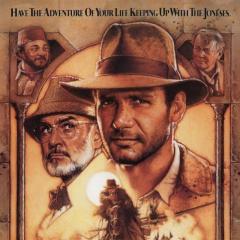
THE EMPIRE STRIKES BACK: 40th Anniversary
SingeMoisi and 2 others reacted to Bellosh for a topic
'The Clash of the Lightsabers' Basically 1:38 to the end you have that beautiful rendition of Yoda's Theme segueing into Lando's Palace theme followed by fantastic treatments of Han Solo and the Princess with a mixture of fanfares throughout. This cue is one of JW's greatest.3 points -
https://www.hollywoodreporter.com/heat-vision/star-wars-writer-sets-record-straight-perceived-last-jedi-jabs-1265168 See the third question - it's something JJ and Chris Terrio came up with. Additionally, Colin Trevorrow's drafts have been leaked (and he's confirmed that they are indeed his drafts) and don't have Palpatine, a clear indication that this was not in the cards from the beginning. Plus, @elvisjones said so, and he's a reliable source.3 points
-

Alf Clausen fired from The Simpsons
Docteur Qui and 2 others reacted to crumbs for a topic
It's obvious Zimmer's clone factory just undercut Clausen and they looked for an excuse to get rid of him and save costs (all while the voice actor fees continue to blow out year on year; eventually something's gotta give). Not that I'm defending the decision, just the reality of how the business operates. This rubbish narrative they've invented to justify getting rid of him is embarrassing.3 points -
3 points
-
Star Wars Disenchantment
Pieter Boelen and 2 others reacted to deleted account for a topic
TFA is constructed very much like Ep 4 is constructed. Secret data is placed in a droid, the droid goes into the desert and is found by a young person with unusually developed skills (Luke's piloting, Rey's scavenging). The young person is taken in by an older father figure (Obi-Wan, Han Solo) who fills the youth in on the state of affairs beyond the desert world. The father figure is murdered by a good guy turned bad and the youth must take up the mantle to carry on the ancient way that is in danger of being lost forever. The good guys attack a colossal super weapon. It's not a carbon copy of Ep 4 - there are differences - but it's clearly built on the spine of a tested formula that JJ knows works - EP 4 is a successful film, not only commercially, but artistically, so he doesn't mess with the structure. [As an aside, I can tell you from personal experience that a big part of JJ's process breaking story is that you have to show him an example where something worked in another film or tv program before he will accept it as an option in whatever you're working on with him] RJ, by contrast, at almost every turn, takes the structure and setup of Ep5 and turns it in the opposite direction. DJ is clearly intended for the audience to relate to as they did to Lando - a scoundrel who betrays the heroes but does the right thing in the end. Only he doesn't. Luke will, perhaps grudgingly like Yoda, finally agree to teach Rey, and his early behavior is a test of her patience to see if she's worthy. Only it isn't - Luke has disconnected himself from the Force entirely and has given up the game. Poe is pulling off the impossible, facing a star destroyer by himself in one tiny x-wing. Instead of being congratulated for heroism as Luke is in the original trilogy, Poe is slapped in the face and demoted. Ben tells Luke - if you face Vader you do it alone, I cannot interfere. In Ep 8, Luke completely interferes by facing Kyle Ren in spirit at the end of the film. The cave sequence in Empire, where Luke faces Vader and finds his own face behind the mask, is mirrored (literally) in Ep 8 when Rey, in trying to see her parents in the dark side cave, only sees herself. The big reveal of Empire, that Vader is Luke's father, is turned against itself when the big reveal of Ep 8 is that Rey's parents are nobodies. If you are saying that Vader's turn to good at the end of Jedi is somehow proof that TFA is not built on following the tropes of Star Wars, because Kylo Ren doesn't turn good at the end of EP 7, with respect, I think that is being too shortsighted. Vader murders Obi-Wan, his old master, "the closest thing he has to father" (dia from ep 2) in front of Luke. Kylo murders Han, his literal father, in front of Rey. Again, let me reiterate, I'm not saying 7 or 8 is better than the other, I am just pointing out that the 2 films are made with very different intentions. JJ reveres the past (and I'm not saying that's a bad thing), RJ says "let go of the past. Kill it if you have to..." (And I'm not saying that's a bad thing either). At their hearts, both films reinforce certain core ideas to the star wars stories, such as the young boy with the Force at the end of Ep 8 and the spirit of hope that Leia carries even as they flee Crait.3 points -
We will come to realize that Lucasfilm specifically designed the Sequel Trilogy - and its seemingly endless, surrounding controversy - to challenge the audience... Star Wars fans, in particular. The film-makers foresaw the division that would be be created due to the fans' assumptions: 'TFA was Mary Sue story and a remake of A New Hope!', 'TLJ was subversive, depressing nonsense!', 'They brought back the Emperor out of nowhere... and desperation!', plot holes, feminism, "poorly executed repetition", etc. The reality is, getting this reaction - the disappointment, complaints, division - was intended, as the audience grossly misunderstood the very purpose of the trilogy. Once people realize the truth of it all, we can begin to unite. And then there's what's coming next with "the stories," which I truly think will be designed to unite. What a devious - but ultimately satisfying - experience it will have been!3 points
-
2 points
-
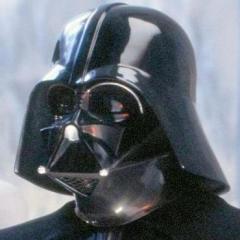
James Horner's Romeo and Juliet (2013)
Smeltington and one other reacted to King Mark for a topic
whew. If they did that with Rise of Skywalker we'd have Music Composed and Conducted by Trailer Music Intern #22 points -
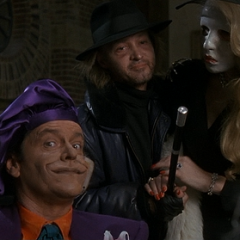
Star Wars Disenchantment
Unlucky Bastard and one other reacted to Gruesome Son of a Bitch for a topic
Kathleen Kennedy really seems to love Rian Johnson. Gave him his own trilogy!2 points -
Is the "Medallion Theme" from Raiders really about the medallion?
Fabulin and one other reacted to Marian Schedenig for a topic
I think it's an interesting consideration. I've always known the theme as the "medallion theme", because my first version of the score was the Silva Screen album, where Lukas Kendall calls it that. But nearly as long as I can think back I've been perplexed by this, because it's used so rarely, and only once in clear connection with the medallion. That happens to be the first time we hear it, so it's an obvious connection to make, but why write a very distinctive theme for a specific object and then only use it for the first time we see that object and then a bunch of other times when we don't (including its biggest statement when the medallion has long left the story)? And if it were a part of the ark theme, why prominently introduce it on its own, in a scene not (directly) related to the ark, but then not use it in most of the major statements of the ark theme?2 points -
Really nice scrutiny and breakdown OP. This is one of Williams' very best minor motifs. The whole Ark theme together including this B section... it is one of my earliest musical memories. This theme had a profound effect on me when I was young.2 points
-
2 points
-
https://www.indiewire.com/2020/05/alexandre-desplat-interview-black-widow-pinocchio-french-dispatch-1202232702/2 points
-
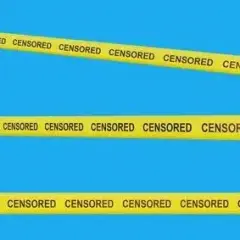
What Is The Last Film You Watched? (Older Films)
Sweeping Strings and one other reacted to Jurassic Shark for a topic
No, it's very long and very boring.2 points -
The Music Of The Hobbit Films - Doug Adams' Book confirmed by Howard Shore
Faleel and one other reacted to Doug Adams for a topic
"Lament for Gandalf" is used (briefly) in Guardians of the Three.2 points -
2 points
-
I liked Dawn of the Dead and Watchmen. Man of Steel was meh and, for me, missed the whole point of the character, and BvS was terrible. 300 was garbage. We skipped Justice League.2 points
-
Elfman’s score was criticised because it didn’t use enough synths and the themes had more than two notes. The comments under his music on YouTube are full of terrible takes. He was criticised for not using HZ or Junkie XL’s themes (if you can call them “themes”). HZ, of course, is known for his use of previously established themes in franchises 🙄. Didn’t he write it in like a week?2 points
-
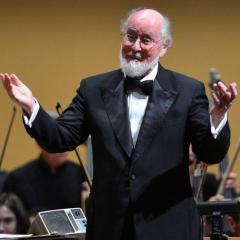
Is the "Medallion Theme" from Raiders really about the medallion?
Docteur Qui and one other reacted to Falstaft for a topic
I wouldn't overthink the label here. The initial few statements of the theme link it with the Medallion, but most subsequent usages are looser. This is not atypical for Williams, or indeed any composer who uses the leitmotif technique in a non-mechanical way. I love the thought and detail you've put into this analysis, @Fabulin, but I confess I'm puzzled by a number aspects, not least of which is the claim the theme is in Eb major. Don't mean to be too dogmatic here, but it's about as unambiguously in Cm as a theme can be. In particular, the G-major at the conclusion constitutes a half-cadential dominant, which may or may not lead to the return to the tonic C-minor. There are Williams themes where tonal function is more ambiguous, of course, but alas this isn't one of them. At the same time, I agree with you that it is an autonomous theme, not a B-section of the Ark Theme. (Though it does retroactively serve that role rather well in Ark Trek and the Miracle of the Ark!)2 points -

THE EMPIRE STRIKES BACK: 40th Anniversary
BrotherSound and one other reacted to crocodile for a topic
My first ever cinema trip. I didn't see a thing of course because I was in the womb. I thought it was probably Return of the Jedi but that was released in Poland in February 1985 (!) which is a month after my birth. And it definitely wasn't the original because Yoda was in it. I know because my mum thought I looked like when I was born (not sure how to take that) 😆 Anyway, it does explain why I have such a soft spot for certain score. When I first heard some of Williams' music from this film around the age of 10 or 12 I experienced chills like never before (or since, for that matter). Karol2 points -
We had a thread for this @mstrox! Posting the news here for posterity, The Simpsons will finally be streaming in its correct aspect ratio on May 28.2 points
-
107 themes (29 returning), 27 choral texts (1 returning).2 points
-

Star Wars Disenchantment
deleted account and one other reacted to Chen G. for a topic
JJ provided him with a fairly legitimate reason: "One boy, an apprentice, turned against him [and killed everyone else]. Luke felt responsible. He just walked away." Johnson just went along with that (plus the added "twist" of Luke having contemplated killing Kylo - which I like). But the set-up is all Abrams'.2 points -
Another mystery box JJ dumped on another writer to solve. Fans, including Hamill, should direct their anger about the handling of Luke towards Abrams, not Johnson. RJ was left with the thankless task of justifying why Luke would abandon his family and the galaxy in the first place. It had to be a legitimate reason, or else his abandonment would be illogical (and the eventual change-of-mind would be cheap).2 points
-
That's on JJ's second run. It may have been his call back to adventure but even in TFA, look at what Mark's doing, that's not overtly a look of "well, time for me to come back" or even "aw shuchs, now I'll have to go back", that's perfectly valid as pain at the past he abandoned following him even back here.2 points
-
True, Rian took all the story threads from TFA then developed and explored them in unexpected directions. JJ just ignored Rian's setup and did his own thing in IX, offering little more than a middle finger to Rian's story threads (Rose, Rey being nobody, Hux undermining Ren turned into little more than a footnote), or totally abandoning others like war profiteering on both sides, Finn's upbringing, etc. All while wasting half the film introducing a bunch of atrocious new JJ characters that were never developed in any meaningful way.2 points
-
Clauson has a point, they fired him and replaced him with robots aping his style, but they have a grievance with him delegating some of the work to other people?2 points
-
Lol. If it's a crime to have others do the work while you slap your name on it then I can think of another composer that might be in trouble...2 points
-

Revenge of the Sith is celebrating 15 years old
crumbs and one other reacted to Gruesome Son of a Bitch for a topic
Really, I didn't know that. You are interesting.2 points -
Gonna resurrect this old thread here. I was interested in watching this again, so I dug it up and realized I've never seen this video shared here before and always thought it was an interesting look into the creation process. Here's James Newton Howard breaking down writing the WB Logo / Main Title moment at the top of the movie and he goes through 4 or 5 versions with different themes and ideas, complete with demos from the film and reactions from David Yates. I'd be curious to see what members here think of the other potential versions. This is certainly reflected here:2 points
-
1 point
-
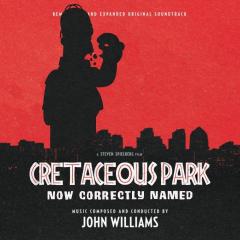
What Is The Last Film You Watched? (Older Films)
Jurassic Shark reacted to rough cut for a topic
Hahaha1 point -
1 point
-
Is the "Medallion Theme" from Raiders really about the medallion?
Docteur Qui reacted to oierem for a topic
The analysis is really interesting. However, I always think music fans have a tendency to over-analyze the meaning of music themes. John Williams has always been very liberal in how he uses themes. He does spend a lot of time creating the "right" themes, but I don't think he spends a lot of time thinking deep meanings for them. I agree that the theme seems to represent a more seductive aspect of the Ark/Medallion, and as Jay says, it always appears alongside with the main Arc theme, except for its first appearance (which is why it's usually associated with the Medallion). Therefore, I agree that the theme is not necessarily a "Medallion theme", but rather a secondary melody associated with the Arc. (There's another hidden appearance of the theme, during the "Map Room" scene, where it's briefly quoted as well). By the way, why do you say the theme is in Eb major? The theme is obviously in C minor, as is the main arc theme.1 point -
JJ didn't even understand his own character, such is the stupidity of her eventual lineage.1 point
-
https://www.hollywoodreporter.com/thr-esq/fox-says-discovery-simpsons-composer-culminated-firing-12923971 point
-
Close Encounters of the Third Kind - La-La Land MUSIC Discussion
OneBuckFilms reacted to Jay for a topic
I listened to the 1998 release a lot when I first got it, which was the first peak of my film scoredom when I was first discovering the magic of film scores in general. Then I really didn't listen to it that often for almost 20 years until this came out, and the amazing new sound quality and new presentation really made me fall in love with the score all over again in a new way. It's a masterpiece.1 point -
"Something more introspective and character driven" has to be the focus of the Final Trilogy. The real villain has always been our inner demons. We must pick our battles wisely and choose selflessness, good, and love over selfishness, evil, and hate. That has always been the primary message of the Saga. What will make Episode X unique is that Rey's battles continue with the Devil having literally possessed her.1 point
-
I deny that TFA heavily suggested that Rey was somehow part of the Skywalker bloodline. People assumed that was the case because the previous two trilogies featured a Skywalker as the hero/protagonist that Rey would also be a Skywalker. On its surface, TFA seemed to be a remake of ANH: a young Force-strong protagonist character from a desert planet who seems to be on a Hero's Journey, droid with a crucial clue for the Rebels, the father/mentor figure killed, a planet-destroying super-weapon destroyed by a squadron of Rebel ships, a tall/dark/Force-strong villain, etc. But people have been deceived. Rey means well... but is defiant, selfish, and possesses or gains specialized skills with no training shown. She gains proficiency using the Force with no instruction, although she was unaware of the Force her entire life. Apart from Finn obsessively wanting to help her, the only person that she has required help from is Ben Solo, who could have killed her on multiple occasions had this been his desire. Just like the film itself, the first full TFA trailer did not imply that Rey was a Skywalker. We know Ben Solo is of Skywalker lineage, so Luke's "The Force is strong in my family... You have that power too." should only be assumed to be directed at Ben. We hear Luke speaking again in the TROS teaser. Rey shown on-screen as Luke is speaking is no proof or indication of anything. It should be assumed that Luke's words, once again, are directed at Ben Solo, who Luke trained as a Jedi for over a decade. "We've passed on all we know. A thousand generations live in you now." The films have been quite clear: Rey has been assigned no lineage. Peoples' assumptions have them confused. It is obvious to me that this was JJ's intention. Rey will not be of Skywalker blood. TROS will reveal that she is a creation of Palpatine, who will (finally) be confirmed to have created Anakin, as well. Of this, I am all but certain.1 point
-
@Chen G. I look forward to your answers to these questions: - At SWC 2019 (in April), Kathleen Kennedy said that 'Palpatine's return was planned from the beginning'. Do you believe her? - Do you think JJ and L. Kasdan wrote all of those lines (above) without an idea of their (intended) meaning? Or perhaps you think that, in making his own movie with 'no criteria or limitations', Rian Johnson scrapped JJ's plans for the trilogy. But how would Johnson have known they were scrapped if 'they didn't meet before he wrote TLJ'? - Do you think John Williams was told of Rey's origin/fate so that he could compose her theme accordingly, with The Emperor and Vader Themes interwoven? - If Disney/Lucasfilm finally admit that the Sequel Trilogy was planned in advance, will you believe them?1 point
-
After his laugh in the teaser trailer and the multiple shot of him in the D23 Special Look, you don't think he's coming back? Who do you think will be the big baddy in Episode IX, the film that will end the Saga?1 point
-
Fine, I'll will reveal my findings and Episode IX theory on October 10, which is a Thursday. Until then, feel free to answer my 'clues to the clues' on the previous page that (very likely) point to the plot of IX... and how the Saga ends.1 point



